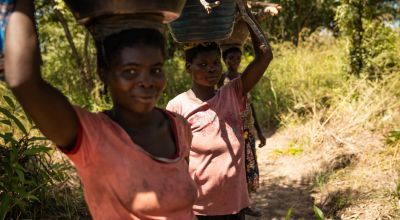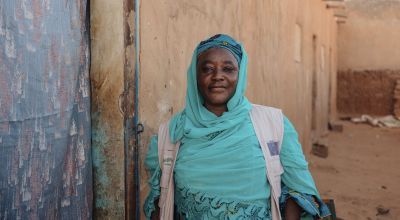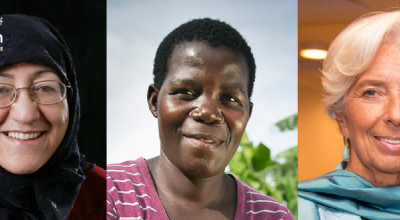
Read our 2023 annual report

Knowledge Hub
Today (March 8th) marks International Women’s Day, a day to celebrate the achievements of women, raise awareness around gender discrimination and bias, and take action to achieve gender parity. However, in the year 2023, we still have a long way to go.
Did you know that at the current rate of progress, it will take 132 years to close the global gender gap? That women make up more than two thirds of the world's estimated 796 million illiterate people? That one in three women has experienced physical or sexual violence by an intimate partner, or sexual violence by a non-intimate partner? Or that less than 20% of all landholders worldwide are women?
Stats like these aren’t just bad news for women. The knock-on effects of gender inequalities can be extensive. They can further broaden equity gaps based on other forms of marginalisation, such as ethnicity, class, religion, or migrant status. When women don’t have the same rights as men, they’re less likely to participate in their local economies, receive an education, be involved with local and national politics, get the healthcare access they need and deserve, or engage with the justice system when needed.
This is why gender equality is one of the main pillars of Concern Worldwide’s work. We specifically focus on gender equality as a means to significantly reduce inequalities and empower people living in extreme poverty to improve their lives. We provide opportunities for women to engage in business and vocational training, employment, education, leadership roles and savings schemes, as well as opportunities to increase their sense of agency and self-belief to maximise their participation. We also promote gender-transformative approaches. This means working with communities to develop programmes that transform the root causes of gender inequality at many layers of society.
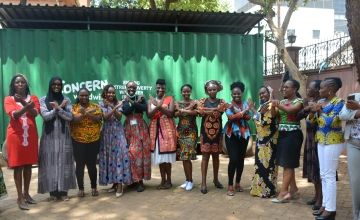
But we don’t just focus on women and girls. Studies have shown that programmes working to end poverty often see limited results when focusing just on women and girls, and in some cases, it can even reverse progress. Our research, and work on the ground, has proven that equality will never be achieved if men are not engaged, consulted and trained as allies and ambassadors.
This is why both men and women were engaged in our Building Resilience through Income Development and Gender Equality (BRIDGE) programme. This Irish Aid funded programme ran from 2019 until 2021 in the Democratic Republic of Congo, and worked with individuals and couples to improve their wellbeing through business, savings and gender equality training. In DRC, 3,000 women and their husbands benefitted from the gender transformative approach in 2021 alone - including Justin and Justine.
Justin and Justine
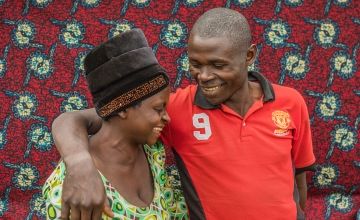
Justin Mupsenzi Mapule and Justine Mahoro Murwanamashaka share four children together, aged nine, seven, five and three, and were displaced from their home in Kibungu. They settled in Burungu, Kisthanga, and first met Concern after sharing their difficulties as internally displaced persons (IDPs).
Justin signed up to engage in the BRIDGE programme, where he received cash transfers to grow his business and training on how to save with the local village savings and loan association (VSLA).
The 34-year-old explained: “The VLSA training taught us how to manage our money; they taught us how to save so that when we face a difficult time, we have some money to help ourselves. After the training, we received 20 dollars a month. With this money, I bought oil that I would then resell and today, I still sell oil. But also because of this money, I was able to rent a land that I cultivate regularly and my business is advancing little by little, and I continue to save my money with the VSLA.”
Growing his business allowed Justin to make improvements in the house and provide more nutritious food for himself and his family. However, the benefits of the training did not stop with Justin, as he shared his new knowledge with his wife Justine.
He said: “My family has benefitted from the training that I had. I used to come back from the induction and explain everything to my wife, and she was very happy to apply all that we were learning. When it comes to work, we plan everything together. I was the beneficiary but I involved my wife because we are together. We are one. When she has time, she goes to get the merchandise, and if I have time, I do it.”
I was the beneficiary but I involved my wife because we are together. We are one.
Justine added that she now feels more respect as a wife, saying: “This education created a big change since we can now run our business and cultivate our land together.”
As well as the business training, BRIDGE beneficiaries like Justin and Justine received training on how gender equality could improve their lives and households. While patriarchal values mean that many men worldwide see household chores, cooking and caring for children as women’s activities, these lessons showed that men can share the burden with their wives. Now, Justin sees how he and Justine divide their work in a whole new light.
“As a husband, I can have fruit in the field, and during harvest season, I could fall ill. And whilst being sick, the fruit would not be harvested,” he explained. “This is where we talked about sharing responsibility. The women can take a machete and do this work. We always say that this work is reserved for men, but it's good when women do it. They will not become men, they will continue to be women.
“That is gender equality. It means to share and support many activities between us so that we can progress. Before learning about this, I used to think that some work is only for women; for example, peeling the foliage of manioc [cassava], washing clothes... Sometimes, I thought it was inconceivable for me to be seen doing it. But after the lessons on gender, we understood that it is not shameful, on the contrary. When the woman leaves the oil over the fire, for example, I as a man can continue cooking. That is working together.
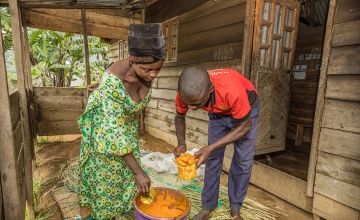
“I am doing this to put the teaching into practice. Sometimes I sweep the floors, I can also cook food if my wife is late, and if she does not come back early, we can eat with the children and leave her food on the side.”
Not only has this given Justine extra free time, but she now feels more respected in their home, and it has improved her communication with Justin. She said: “I feel good when my husband helps me, I can relax more. It used to make me sad when he didn't help me. I used to go to the field and come back home, then start cooking. I felt bad. But today it's better.
“I also help him from time to time. For example, when he is sick, I take care of the harvest. The teachings from Concern have made our love grow.”



